Cossack Cromes: the triumph of Ataman Korela
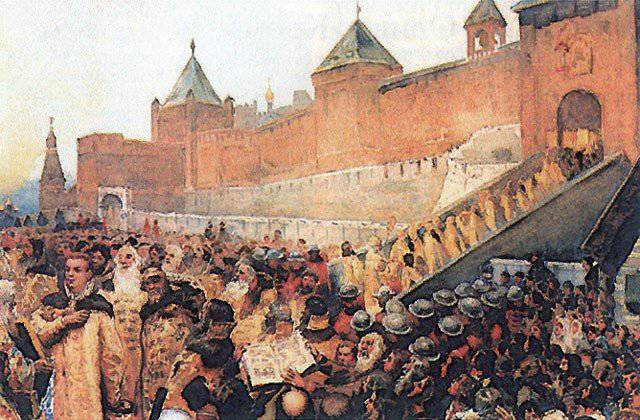
As a betrayal of the Muscovite governor and the valor of the Cossacks opened the False Dmitry to I the way to the Kremlin
The Russian Smoot 1600 — 1614 personally demonstrated that the domestic story during periods of profound social and economic upheavals, it is largely driven not so much by the valor of citizens who consciously protect the national interests of the country, but by the treachery and greed of the power elite. In the modern era, this trend of Russian history is more than obvious: the treachery of the autocratic Nicholas II’s autocracy of the Russian Empire; the general betrayal of the Russian officers' corps, who rushed for the “lentil soup” to build the Red Army for the Bolsheviks; betrayal of Denikin, who refused to make a connection with Kolchak; finally, the betrayal of the highest elite of the CPSU of their own country in the era of "perestroika".
In the ancient and medieval history of Russia, the facts of fateful betrayal are much less, but in all cases it is truly strategic in nature, that is, it determines the course of Russian history for decades, if not centuries ahead. One of these fateful betrayals was the transition of the Russian army of the Godunov dynasty under the banner of the defrocked renegade Grigory Otrepyev, who presented himself as Tsarevich Dimitry, the younger son of Ivan the Terrible.
Cossack fuse in the mine defrocked
As mentioned in the previous article about the Troubles, October 13 1604, the rebel army of Gregory Otrepyev crossed the Dnieper and began to move to the nearest Russian fortress - Moravsk (Monastic fortress). The official version of the history of the Russian Distemper, developed by the court historians of the Romanov dynasty and fully mastered by the textbooks of the modern Russian Federation, states that the Poles were the main force of the False Dmitry's army in the battles with Muscovy. The Polish gentry of the Rzecz Pospolita bordering with Russia was supposedly so interested in rejecting Seversk lands from Muscovy, which equipped an impostor army and provided him with a "green card" to cross the Russian border.
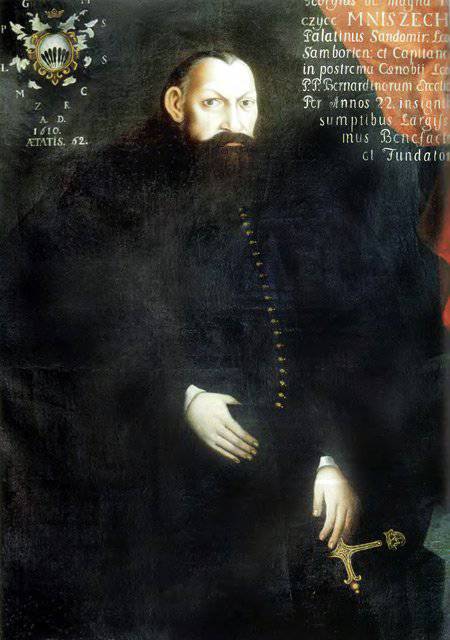
In fact, everything was exactly the opposite. The Polish nobility of the voivodships bordering on Russia reacted with extreme caution to the military strivings of the Russian strife, rightly seeing in them a dangerous precedent for Moscow to start a war against Poland, from which their voivodship would have suffered first and foremost. The impoverished Sambir voivode Yuri Mnishek became the only real ally of Grishka Otrepyev.
The “help” of the Polish crown to the impostor’s case was exhausted at the initial stage by tacit consent to convene any rabble by Mnishek, a total of miserable 1600 people who didn’t dream of capturing distant Moscow, but firmly counted on robbing Russian border lands and financial promises of Otrepiev. At the crossing of the Dnieper, this gathering stood for several days, because Cherkasy voivode Jan Ostrogsky ordered to hijack all boats and ferries from the Dnieper crossings in order to prevent an impostor from invading Russia. The Cossacks rescued the False Dmitry, who “by violence and weapons the Kiev burghers were confiscated by the floating craft and drove them to the impostor’s camp. Actually, only the Cossacks, of whom the number was apparently three times more than the number of ethnic Poles, eagerly wanted to go to Moscow and get even with the hated “Boryskaya”.
After crossing the Dnieper, the Polish retinue of the False Dmitry was not too eager to fight with the Muscovites. Activators of the process again made the Cossacks.
Already on October 15 1604, that is, on the second day after the crossing, the forward detachment of ataman Beleshko secretly approached Moravsk. Since Beleshko had no siege weapons to storm the fortress, the ataman decided to seize the fortress with military cunning.
Deliberately dismissing all the banners and dressing in the best clothes, the Cossacks marched to the walls of Morovsk with a marching line and at the end of the pikes handed the garrison the command of the “prince” about the oath. While the Muscovites, amazed by such audacity, did not come to their senses, Beleshko told them that the county-based Chernigov voluntarily surrendered to Dimitrii and there they already swore to him. The military governor Boris Lodygin, who had not lost his mind, tried to challenge Beleshko’s words about the surrender of Chernigov, but the cunning chieftain immediately ordered the riflemen to “knit a traitor”. What was immediately fulfilled, because in history everything has a limit, only stupidity and cowardice are limitless. The capture of Moravska by the Cossacks immediately reinforced the army of defrocking seven guns and twenty blasted tweeters. Otrepyev himself "crawled" to Moravsk, together with the Poles, only a week later - October 21.
For Moravsky came the turn of Chernigov. Here, the Muscovites did not indulge in discussions, but met Cossack parliamentarians with a cannon volley. However, this did not last long: after a few days, disguised as peasants, the Cossacks drove into Chernigov on five "mills" carts. In these carts, of course, it was not flour, but the Cossack “special forces” armed to the teeth - plasters. Having tied up the security of the central square of Chernigov, the Cossacks struck the alarm bell with a church bell. Then everything went according to the Moravian scenario: “black people” and archers ran to the square, they were read out on behalf of the new government an “imposing letter” by an impostor demanding to “knit” Governor Ivan Tatev. What the people did with great pleasure.
The Russian commoners in Chernigov counted, of course, on the justice of the “legal king”, but they were greatly deceived in their hopes, because, unlike Moravsk, Chernihiv county had something to rob. As a result, the city was plundered by the Cossacks and Poles to the last.
Mediocrity of the royal governors
To help Chernigov had to hurry the youngest and most fortunate of the Russian governor of that time, Peter Basmanov. However, he was “in a hurry” so quickly that, fifteen miles from Chernigov, he had already received news of the capture of the city by Lzhedmitry. Since he did not have any special military forces, Basmanov considered it best to take refuge in the walls of the nearby Novgorod-Seversk fortress.
If Otrep'ev gave way to the Cossacks and would act more boldly himself, then, probably, Novgorod-Severskaya fortress would be quickly taken. However, the impostor was in no hurry, and only 11 November 1604 of the year approached Novogorod-Seversk.
For two days the army of the renegade stood at the walls of the city, losing time in meaningless negotiations. On November 13, the Poles, having built up a "turtle", attempted to break into the fortress, but were repulsed with heavy losses. On the night of 17 on 18, a new assault followed in November, this time there were even more casualties.
The next day, the nobility staged a rebellion, in which the Falsdmitry stated in plain language that the Poles "do not have the obligation to take the city by attack, but they do not refuse it either, if only a hole is punched in the wall." It soon became clear that the Poles intended to leave for Poland. From their point of view, this was, of course, the right decision: everything that could have been plundered in the Seversky Territory was already plundered, and the nobility somehow did not want to die for the interests of potential son-in-law of Yuri Mnishek. Lyahi unequivocally offered Otrepyev to leave with them. In despair, the shelling fell to his knees in front of the “knights”. The Poles looked with disdain at Muscovite and did not change their decision in the least.
Defragment, as in many key moments of his odyssey, rescued the case. First, the Jesuit fathers, who were in the Polish camp, ardently stood up for him and managed to persuade some of the Poles to stay. And secondly, as a confirmation of their words about the “special mission” of the False Dmitry, a messenger flew into the Polish camp on a moonshine horse with a message about the capture of Putivl by the Cossacks.
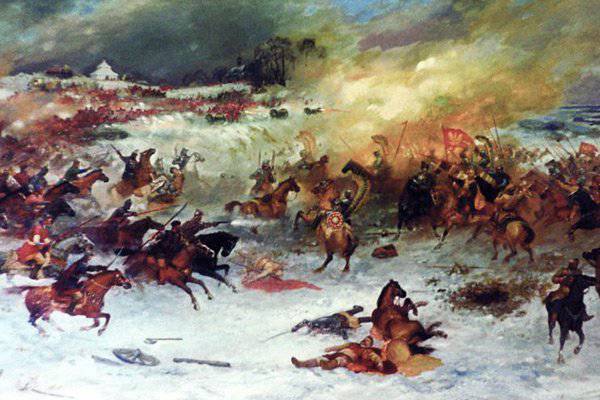
From Putivl, the Falsdmitry army advanced to the village of Dobrynichi, in the vicinity of which the Polish hussars left behind with the stride were able to chop Russian Foragerists around 500. On January 19, the army of False Dmitry became close to the army of the Muscovites, which, under the command of Prince Fyodor Mstislavsky, strengthened on the outskirts of the village. The false Dmitry gathered a military council, where opinions were divided: the Cossack chieftains, pointing to the considerable power of the Russian artillery, suggested immediately attacking the Muscovites, preferably in the very early morning, almost in the dark. The Poles objected and demanded talks with Mstislavsky.
As a result, the messing up of opinions all turned out through the stump-deck: they were still in the dark, but too late - when they approached the Russian positions it was completely dawn. The Poles, having collected all the cavalry in a fist, including four thousand Cossacks, with the whole mass hit the right flank of the Muscovites. The regiment of the left hand, headed by Prince Vasily Shuisky, hastily retreated to the village. It seemed that the Russian order was overturned and the matter remained for small. However, this was not the case - the center of the village was held by a detachment of German mercenaries commanded by captains Margeret and von Rosen. A regiment of rifle-armed archers was attached to the Germans.
Having seen how Muscovites overturned by the Zaporozhian Cossacks, the cold-blooded German professionals did not flinch. They rolled out field artillery to direct fire and lined up four lines of all the soldiers who had food. Letting the Cossacks close to the guns, the Germans fired a coordinated volley from all the guns. Following the two agreed volley gave the archers. The result of all this was terrible: the vanguard of the Zaporozhian Cossacks was in fact mowed out with a canister and bullets. Seeing such a finale of the Cossacks, the Poles, along with Otrepiev, ran. The numerous infantry of the impostor, made up of recruited Seversk peasants, turned out to be completely useless. Lapotniki, seeing the retreating Poles and Cossacks, did not think about anything except escape.
The rout was complete. Dutch diplomat Isaac Massa, who was at the time of these events in Moscow, reports on 8 thousands of dead Poles, including Cossacks. The records of the Muscovy Order of the Order indicated that on the battlefield at Dobrynichy 11,5 thousands of corpses were found and buried, of which about seven thousand were “Cherkasy”, that is, tribal Cossacks.
Grishka Otrepiev survived a miracle. Two circumstances contributed to this: the heroism of the Don Cossacks and the foolish Muscovite commanders. Retreating, the False Dmitrii covered himself from the Russian cavalry with a fresh detachment of three hundred Don Cossacks, who were in reserve. Having struck the advancing cavalry of the Muscovites in the forehead, the Don men were killed every single one, but they gave the opportunity to the impostor to break away from his pursuers.
However, this destruction of the Cossack reserve would not have saved the defrost from a well-deserved blow with a saber, if Prince Fedor Mstislavsky had been able to organize at least some methodical pursuit of the remnants of the rebel forces. Instead, the aged boyar decided to be prudent and for three days stood aimlessly at Dobrynichy. Then, instead of a decisive sweep of the Seversk land from the troops of the False Dmitry, the nobleman started cleaning the Komaritsky volost of the Bryansk district from the Great Russian men. Throughout the parish, several thousand gallows were put up, on which, where one by one, and where, and three, lapotnye men, who were suspected of sympathizing with the impostor, were turned up.
"Warlock" ataman Korela
After the defeat of Dobrynichey, the False Dmitriy had only one and the last trump card: the fortress of Kromy. This uncomplicated fortification rear fortress, located on the eastern outskirts of Severshchina, opened the direct route to Mtsensk and Tula, and therefore to Moscow. The proximity of Krom to Moscow in the most annoying way acted on Boris Godunov and his incompetent voevod, that is why already since December 1604 of the year (that is, long before the battle of Dobrynichy), this fortress was under siege by the “spare army” of governor Fyodor Sheremetev. Since it soon became clear that Sheremetev in the field of military art was a complete zero, his “spare army” was constantly strengthened, counting on the human mass to compensate for the lack of morale and failures of the military organization.
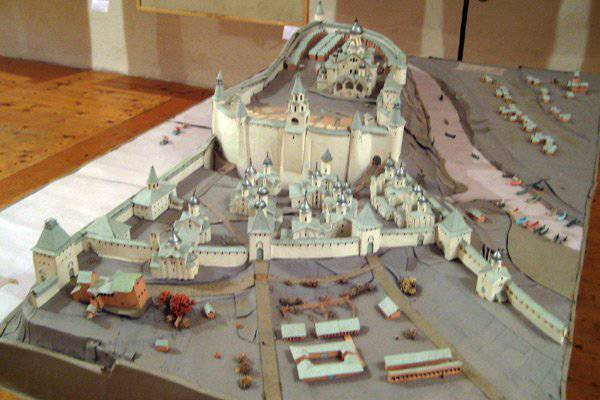
In January 1605, the discharge order brought heavy siege artillery to the Kromy camp. The German mortars, exceptional in destructive power, and the special “Lev Slobodskaya” stencil wall gun did not help, but now Sheremetev could be referred to the lack of archers. Boris Godunov, worried about the fate of the dynasty, immediately gave extra strength. The army of Prince Ivan Shcherbaty advanced from Mtsensk to help Sheremetev, and in February a select streltsy regiment of the clerk Vladimir Buturlin approached.
It seemed that under Kromy in the Russian camp so much effort and resources had been gathered that the low earthen fortress was guaranteed to be ground into powder. Indeed, everything necessary was gathered here: the darkness of the soldiers and unique artillery. It lacked only determination and courage, i.e. just that military will, the shortage of which was always felt in the army units of Muscovy.
A false Dmitry was no worse than the Muscovites who understood the strategic importance of Crom in this long war. Therefore, even before the defeat at Dobrynichi, he sent about three thousand Don Cossacks under the command of ataman Andrei Korela to help the fortress. The choice of this ataman turned out to be another good luck of Otrepyev.
Among the Cossacks, the ataman Korela had a reputation as a “character”, that is, a pagan healer, fluent in ancient Vedic practices of witchcraft and conspiracy. Not tall, stocky, full of scars, Korela looked at her companion with shining, almost phosphorescent, bright blue eyes. “He had eyes of a basilisk,” Isaac Massa wrote about Korela with poorly disguised horror, “so that no one could stand his gaze, however, this is not surprising, because this man was known as a warlock.”
The military order of the “characterists” that existed among the Cossacks was one of the most mysterious institutions of the Zaporizhian Sich. Some ritual practices of the “character”, for example, cutting off the head of the first killed enemy, as well as preserving in the Army the severed right hand of the dead famous atamans, testify to the Sarmatian-Alanian roots of this ancient order.
The "characters" practiced the so-called "character" - complex, essentially pagan (Vedic) conspiracy practices designed to protect the Cossack from a bullet, a hot horse from the fuse, both of them from a snake bite, carried out a slander on the guns and thoughts of the enemy, "jammed" the blood flowing from a deep wound.
Some actions of Korela beyond the idea that he really was a "character", or as they said in the Middle Ages - a warlock, do not find a reasonable explanation. For example, it is completely incomprehensible how in broad daylight he led a detachment of three thousand Cossacks and a whole convoy with food to break through to Kromy through the battle formations of the Muscovites of voivode Sheremetev. The stolnik Buturlin, who conducted a special inquiry, recorded in his protocol that the Sheremetev archers "heard tokmo many times to dig and snore a horse, so many people hid sledges, but I don’t see anything like that."
It is possible to decide, of course, that the Muscovites, tired of a useless siege, simply missed Korela’s breakthrough into the fortress. But what about the second breakthrough to Kromy by five hundred Cossacks on a hundred wagons filled with bread, sent by Falsiter, who responded to Korela's letter describing the famine of the defenders of the fortress? One hundred carts passed unharmed through the eighty thousand strong troops besieging, and no one could prevent it! Indeed, we can agree with the opinion of the well-known Cossack historian V. D. Sukhorukov, who noted in amazement: “For contemporaries, the siege of Crom seemed so incomprehensible that the Swedish diplomat Petrey in his notes calls Korela a wizard.”
Cossack feast on the bones of the Muscovites
In early March, 1605, at Krom, united all the main forces of the Russian army. The number of royal troops exceeded 80 thousands of people, and, perhaps, was even greater, because the very informed Dutchman Isaac Massa wrote about the "good three hundred thousand people" who besieged the fortress.
The number of all Don Cossacks defending in Kromy, taking into account the inevitable losses, was hardly more than three thousand. However, unlike the inert, inert Muscovites, who are more hoping for firing from “Lev Slobodskiy” than for their own courage, the Cossacks from the first day of Korela's breakthrough into the fortress chose a tactic of permanent attack. Isaac Massa describes how it happened colorfully and with knowledge of texture: “Every day, two or three hundred foot-handed Cossacks with long flames made forays from Crom, lured some hunters from the camp to earn their honor, believing that they were riding the horses, but Cossacks so skillful in shooting muskets and long beeps that they didn’t give a blunder and always had time to shoot a horseman or a horse, and so every day thirty, fifty, sixty soldiers from the Moscow army were put dead, among whom there were many young, rasivyh nobles and had people to look for the honor. "
Under Kromy for many months, a kind of negative selection of the passionarity of the Russian army took place: the most enterprising and impertinent Muscovites regularly fired at the Cossacks, the quiet and the underwear continued senselessly and unsupportively to pull the sovereign.
Cossacks Korela brilliantly beat Moscow governor and in the psychological war. On the shaft of the fortress with enviable regularity, writes Massa, there came out a “slut in which the mother gave birth, who sang diarrhea songs about the Moscow governors, and [there was] a lot of other things about which it is indecent to tell; and the army of the Muscovites, to my shame, should have taken it all down. ” One can imagine how Moscow archers felt in cold tents, for many months already deprived of female affection and bound by army discipline, when they heard the cheerful squeal of women heard from behind the fortress walls, the trumpet sound of battle horns and the bellicose songs of the Coleting Cossacks. "The Muscovites did not know the rest," notes Isaac Massa, "the Cossacks either suddenly attacked them, then fired upon, then mocked them or deceived them."
The disorganization and moral decline of the army of Fyodor Mstislavsky was fully manifested in one of the days of mid-March. After two days of almost continuous firing, the Russians finally managed to set fire to Krom’s internal wooden walls, which had burned down. The Russians, in a rage, went to the assault - "firing on the city and on the hail of strong nalyagah, bravely and courageously." They managed to break through, finally, to the fortress through the murderous rifle shelling of the Cossacks and capture the shaft. However, the Cossacks did not retreat and did not capitulate: all, as one, they rushed to beat off the shaft - the most severe hand-to-hand fight went. Even the seriously wounded Cossacks crawled out of the hospital burrows dug up as shelters at the base of the rampart, many of whom died of tension and blood loss, but continued to shoot until their last breath. Nevertheless, it seemed that the outcome of the assault in favor of the Great Russians was already predetermined: the forces that had stormed and defended were too incomparable. And then, when everything was at stake, at the time of the highest tension of the Russian troops, the advanced regiment of the Muscovites, commanded by Mikhail Saltykov, began to retreat. Subsequently, contemporaries suspected Saltykov that he “strived for the damned thief Grishka”. Whether this was so is impossible to establish now, but if so, then Saltykov, in the matter of treason and betrayal, was far from alone, and certainly not the first.
Monstrous betrayal
13 April 1605, Boris Godunov gave a dinner in the Kremlin for nearby nobles. The king looked cheerful and cheerful, ate a good meal and climbed the observation tower to look at Moscow. However, after two hours, Godunov felt very bad, and there was blood from his ears and nose. The time period of two hours is known to pharmacologists under the scientific name “the line of osmotic absorption.” In simple terms, after two hours from the meal time, it is no longer possible to clear the body of poison, if it was in food, by inducing vomiting, washing the stomach, etc.
The king faded rapidly: from the moment the first symptoms of poisoning manifested to death, it took less than half an hour. On the question of the boyars about the oath to the heir Fyodor, the dying, trembling all over, managed only to utter: "As God pleases and all the people." After that, the king instantly lost his tongue and came general paralysis.
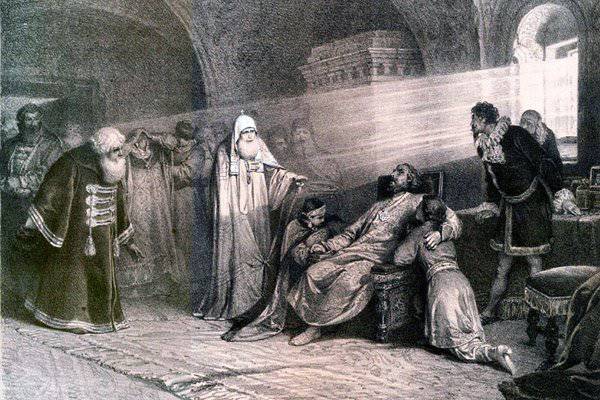
The declarative oath of the Boyar Duma, the army and the people to the new Tsar Fyodor Godunov, who was barely 16 years old, passed in Moscow without difficulty. However, in the realm of real politics, the death of Tsar Boris launched a terrible flywheel of indiscriminate betrayal, cowardice and greed of the Muscovite elite.
Young Fedor, fulfilling the will of his father, decided to appoint the nominee and Tsar Boris's favorite, Governor Peter Basmanov, to be the de facto commander of the Russian army to fight the False Dmitry. However, an influential boyar of the Godunov family, Semyon Godunov, intervened in the process of reforming the army, who decided to achieve the post of commander-in-chief for his son-in-law, Prince A. A. Telyatevsky-Khripun, from local motives. The young king obeyed the “experienced” uncle and appointed Peter Basmanov as the second commander of the royal troops under Kromy. This rash decision, among others, predetermined the death of the dynasty.
Peter Basmanov, having received the news of his appointment as the second commander, declared to the boyars that he would not go to the “slave” to Semen Godunov's son-in-law. With a “gallant” voivod, a hysterics happened in the style of a signatory Ryazan woman: falling in the middle of the “discharge” tent, Basmanov, according to eyewitnesses, “wept for an hour, lying on the table.” Crying, the boyar planned betrayal.
Arriving at Kromy, Peter Basmanov, having agreed with two more commanders, Vasily Golitsyn and Zamyatny Saburov, began to prepare an insurrection in favor of Falsdime. The boyars Golitsyn and Peter Basmanov "incited the princes and nobles and children of the boyars of Seversk and Ryazan of all the cities that had been in the army for one person, but for the Novgorod landowners and the Pskov and Lutz princes ...".
Grishka Otrepiev, locked in Putyvl, had neither the strength nor the determination to venture into a new battle with the colossal Russian army. Boyar Russia, figuratively speaking, gutted itself — cutting its belly that had eaten at Godunov with a curved dagger of treachery and sedition.
“Don't fight against us!”
At dawn on May 7, 1605 of the year unexpectedly erupted tents and buildings in various places of the Muscovite camp. Arson made rebellious Ryazan under the command of the brothers Lyapunov. There was a frenetic noise. Frightened by the threat of attacks by the Cossacks, half-dressed Muscovites rushed aimlessly around the camp. According to an eyewitness of events, no one “could comprehend how and how [the fire] happened, and did not know who the enemy and who is friend, and rushed, like dust, blown up by the wind.”
All the main governors - M.P. Katyrev, A.A. Telyatevsky, I.I. Godunov, M.G. Saltykov - remained faithful to the oath. For a moment it seemed that they would succeed in curbing the crowd of armed muddlers and cowards, embarrassed by traitors. At this unsustainable moment, one of the leaders of the rebellion, Prince Vasily Golitsyn, ordered his slaves to beat and tie themselves in order to be able to justify themselves in case of failure.
The case again decided Cossack valor. Seeing a stir in the camp of the Muscovites, the ataman Korela ordered to open the gates of the fortress and threw all the Cossacks at the compound with the rebels. The pontoon bridge leading from the fortress to the camp overflowed with people and began to sink, hundreds of people, it is not clear what kind of submission, found themselves in the water. In this theater of the absurd, the only armed force that preserved order and calm was the regiment of German mercenaries under the command of Captain Walter von Rosen. The Germans raised their standard, built up in a square and bristled with muskets. The essence of what is happening for them soon became clear, and they were waiting for the command of the chief commander M. I. Katyrev to rigidly “bring to life” demoralized archers.
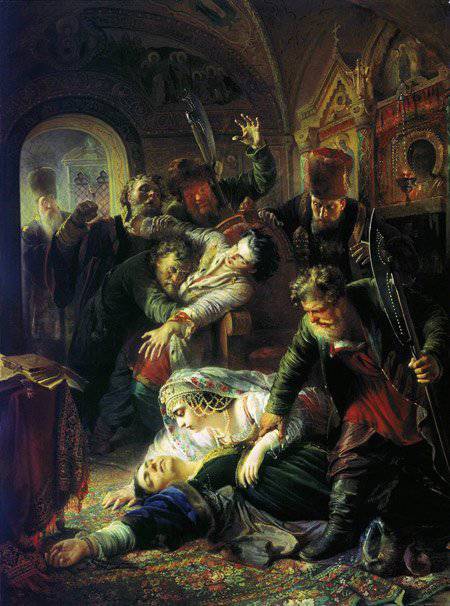
Alas, Mikhail Katyrev, however, like the rest of the faithful governors, showed incredible cowardice in these events. An artillery regiment remained loyal to his subordination, which would have destroyed a bridge through a direct fire from one salvo through which the insurgents connected to the Cossacks. Von Rosen waited more than an hour and a half from the Russian governors for an order to open fire on the rebels, but he did not wait.
Meanwhile, genuine fun began in the camp of the Muscovites. The Cossacks, removing their sabers and daggers, grabbed their legs and merrily drove the demoralized crowd away from the camp. In the discharge book 1650 of the year, these events are written like this: “... Don Cossacks, who drive them, count them [the Muscovites] with their swords; to the place of the Sich and the murders - whip them and, chasing, laughing and saying: “Yes, then don't go into battle against us!”. The coup ended almost bloodless.
Having received lashes in abundance, forcibly mobilized Muscovite lapotniki happily fled their homes. Following the serfs, also rubbing the cut sides, most of the Russian nobles departed gloomily to their patrimonies. The road to Moscow to the sacred royal throne of Russia for the homeless thrashing of Otrepyev was completely open.
Within a few weeks, as ordered by the False Dmitry, the handsome and clever man, the creator of the first geographical map of Russia, Tsar Fedor Borisovich Godunov, was brutally strangled by four murderers led by clerk Ivan Bogdanov. A strong and strong boy fought with his killers to the last breath.
Ivan Bogdanov soon lost his mind and, considering himself a dog, howled at night and gnawed under the table abandoned bones. Vasily Golitsyn died of “fiery fever” in 1616, while sitting in a damp basement in Polish captivity. The death of Peter Basmanov was also disgusting. When the 17 of May 1606, the rebel against the False Dmitry, the boyars with their battle serfs rushed into the Kremlin, the “great voivode” was killed by a dagger blow in the heart. His body was dragged out of the Kremlin and thrown under the table on which Otrepyev’s mutilated body lay.
And what about the chieftain Korela? Cossack Korela, according to contemporaries, somehow disappeared unnoticed. Some saw that he was drunk. But the character trainees, according to knowledgeable people, do not drink too much, they just leave for Irii at the time of the trial for them.
Information